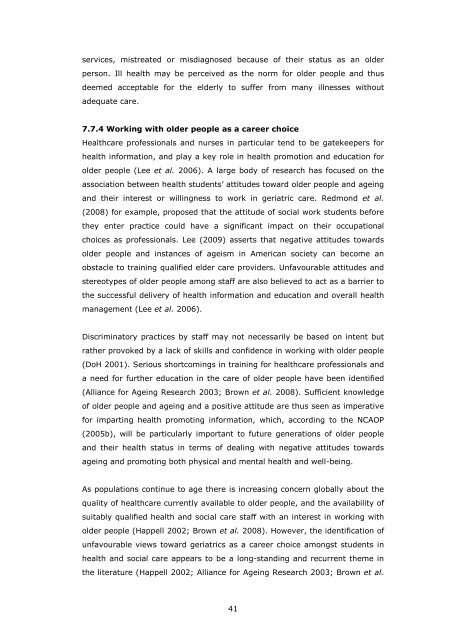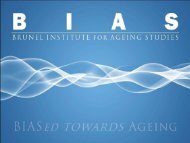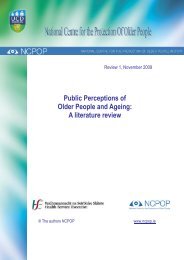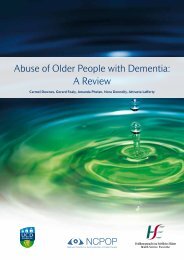Public Perceptions of Older People A literature review
Review 1 PP OP.pdf - National Centre for the Protection of Older ...
Review 1 PP OP.pdf - National Centre for the Protection of Older ...
Create successful ePaper yourself
Turn your PDF publications into a flip-book with our unique Google optimized e-Paper software.
services, mistreated or misdiagnosed because <strong>of</strong> their status as an older<br />
person. Ill health may be perceived as the norm for older people and thus<br />
deemed acceptable for the elderly to suffer from many illnesses without<br />
adequate care.<br />
7.7.4 Working with older people as a career choice<br />
Healthcare pr<strong>of</strong>essionals and nurses in particular tend to be gatekeepers for<br />
health information, and play a key role in health promotion and education for<br />
older people (Lee et al. 2006). A large body <strong>of</strong> research has focused on the<br />
association between health students’ attitudes toward older people and ageing<br />
and their interest or willingness to work in geriatric care. Redmond et al.<br />
(2008) for example, proposed that the attitude <strong>of</strong> social work students before<br />
they enter practice could have a significant impact on their occupational<br />
choices as pr<strong>of</strong>essionals. Lee (2009) asserts that negative attitudes towards<br />
older people and instances <strong>of</strong> ageism in American society can become an<br />
obstacle to training qualified elder care providers. Unfavourable attitudes and<br />
stereotypes <strong>of</strong> older people among staff are also believed to act as a barrier to<br />
the successful delivery <strong>of</strong> health information and education and overall health<br />
management (Lee et al. 2006).<br />
Discriminatory practices by staff may not necessarily be based on intent but<br />
rather provoked by a lack <strong>of</strong> skills and confidence in working with older people<br />
(DoH 2001). Serious shortcomings in training for healthcare pr<strong>of</strong>essionals and<br />
a need for further education in the care <strong>of</strong> older people have been identified<br />
(Alliance for Ageing Research 2003; Brown et al. 2008). Sufficient knowledge<br />
<strong>of</strong> older people and ageing and a positive attitude are thus seen as imperative<br />
for imparting health promoting information, which, according to the NCAOP<br />
(2005b), will be particularly important to future generations <strong>of</strong> older people<br />
and their health status in terms <strong>of</strong> dealing with negative attitudes towards<br />
ageing and promoting both physical and mental health and well-being.<br />
As populations continue to age there is increasing concern globally about the<br />
quality <strong>of</strong> healthcare currently available to older people, and the availability <strong>of</strong><br />
suitably qualified health and social care staff with an interest in working with<br />
older people (Happell 2002; Brown et al. 2008). However, the identification <strong>of</strong><br />
unfavourable views toward geriatrics as a career choice amongst students in<br />
health and social care appears to be a long-standing and recurrent theme in<br />
the <strong>literature</strong> (Happell 2002; Alliance for Ageing Research 2003; Brown et al.<br />
41









